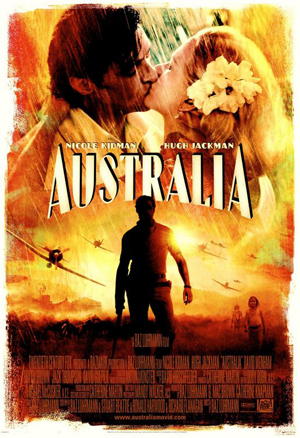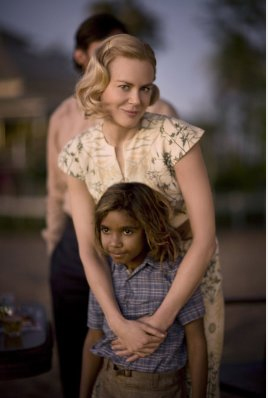|
Australia
Baz
Luhrmann's Australia is about telling a story.
In fact, it's about telling so many stories you may have
trouble remembering the single film viewing, and instead
recall three or four vaguely different tales.
Blended
in the one hundred sixty five minutes of cinema you'll find
sweeping remembrances of How the West Was Won, Tora
Tora Tora, Crocodile Dundee 2, The African Queen and
just a touch of The Jungle Book. Funny, but it
all seems to work after a fashion.
In short,
this is an historical epic, exploiting a country so similar
yet so different from what we know of Australia and what
most of us have seen in earlier films set in this amazing
land. Nearly all of the rowdy boisterous life we expect
in the down-under is on display. But we're also exposed
to the patient mysticism of the native Aborigine, the powerful
cattle industry with its so close to American stereotypes
of the cowboy and cattle rancher, and some surprising history
about its invasion during World War II. All stories so familiar,
but just askew enough to make them new again.
Certainly the
countryside of Australia is the biggest part cast for this
film, and Luhrmann exploits it at every opportunity. His
camera flies over the countryside, lands beside our heroes,
then shoots up into the sky looking down to show how small
they are in perspective to this huge wilderness.
But
the story that is told, is... well, about stories. From
the opening scene where we're introduced to a half-breed
aborigine child Nullah, the grandson of the aborigine leader/mystic
King George. Indeed, Nullah is learning storytelling and
magic from his grandfather, magic which subtly comes into
play during the story, or perhaps not - it's left for the
viewer to decide.
Magic,
singing, and storytelling all seem to knit this larger tale
together as recently widowed Lady Sarah Ashley (Nicole Kidman)
comes to Austrailia to take over her husbands holdings:
one of the last large cattle ranches in Australia not owned
by cattle baron "King" Carney.
In somewhat
predictable fashion, like the Katherine Hepburn material
Kidman has chosen to wear for this outing, Lady Ashley is
straight laced and unreasonably self-confident. Just the
kind of woman you throw the recently christened "sexiest
man in America" at to see what chemical reactions will
result.
Hugh
Jackman plays Drover, his name and profession, as a drover
is the Aussie version of the cattle drive manager. Lady
Ashley quickly understands that to save her holdings she
will have to put up with the reasonably self-confident Drover
and launch a cattle drive across the wilds of Texas... er...
Australia.
It does
get a little confusing as it is so familiar in both plot
and environment, and yet just when you think the truck is
going to be attacked by indians, it turns out just to be
kangaroos.
So the first
half of the film centers on this odd crew, an impossible
mission, and the growing appreciation in Ashley for both
her situation and companions. By the time they get to the
end of the trail, she's a changed woman, and their relationships
are all about to change. Momentarily it becomes the tale
of an odd family, one still under the threat of the unscrupulous
cattle competitors, but still one of charm and entertainment.
Of course, that
won't last. We've still got about 90 minutes to fill, and
a whole separate movie to show.
The
rumbling undercurrent of the realities of World War II finally
land in Australia as the war heats up and the fairly little-told
tale of Japanese invasion begins. In a manner similar to
vengeful aristocratic actions in Titanic, the bombing
and occupation doesn't stand in the way of trying to get
a bit of personal payback for prior schemes undone.
Without
spoiling much, just about everything that has been hinted
about in the first part of the film comes true, as well
as the timely and charming musical trigger for the Hollywood
ending.
Music
is important here, obviously not as artificially as in Luhrmann's
prior outings of Moulin Rouge! or Romeo + Juliet
of course, but certainly key in its naturalness. There's
a musical aspect to the boy's magic, there's a fairly convincing
scene where accomplished singer Kidman convinces us she
cannot actually sing or recall the words to "Somewhere
Over the Rainbow," and there's the haunting music of
the aboriginal mystic. Music evokes memory and there's even
a little Casablanca moment where Jackman tells
his long-time aboriginal pal not to "sing that song."
Again, we laugh at this scene not because it's terribly
funny, but because the situation is so similar to Rick and
Sam's.
Australia
wants desperately to be a big movie, and accomplishes that
in length and grandeur. As a cinematographer Luhrmann has
exceeded expecations. Most frames of the film could themselves
be framed and hung on a wall; it is uniformly beautiful
and majestic. And while Luhrmann seems to have grown out
of his earlier camera trickery, over and undercranking and
staging excesses (which some love but most hate), he falls
a bit short of creating original movie magic here.
Still
Australia is worth viewing, one of the more entertaining
movies of the year, and the length of the film is bereft
of dragging or boredom. And that accomplishment, in itself,
seems somewhat magical.
|








